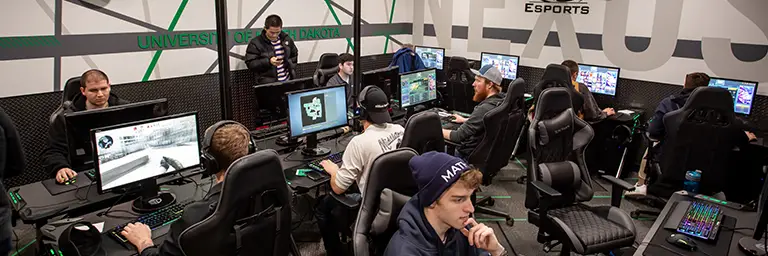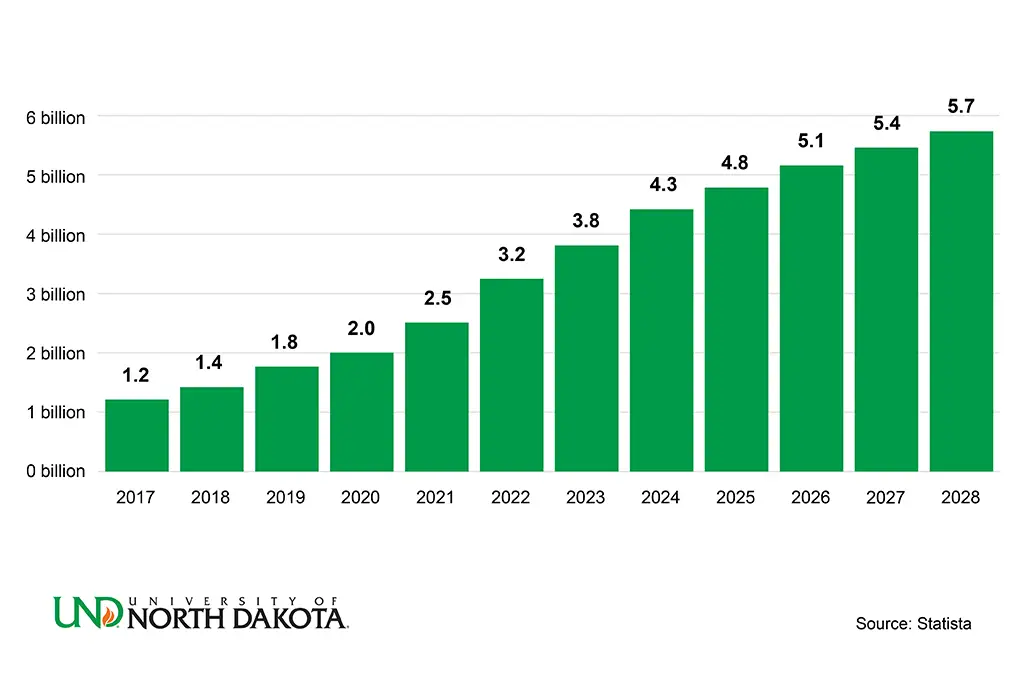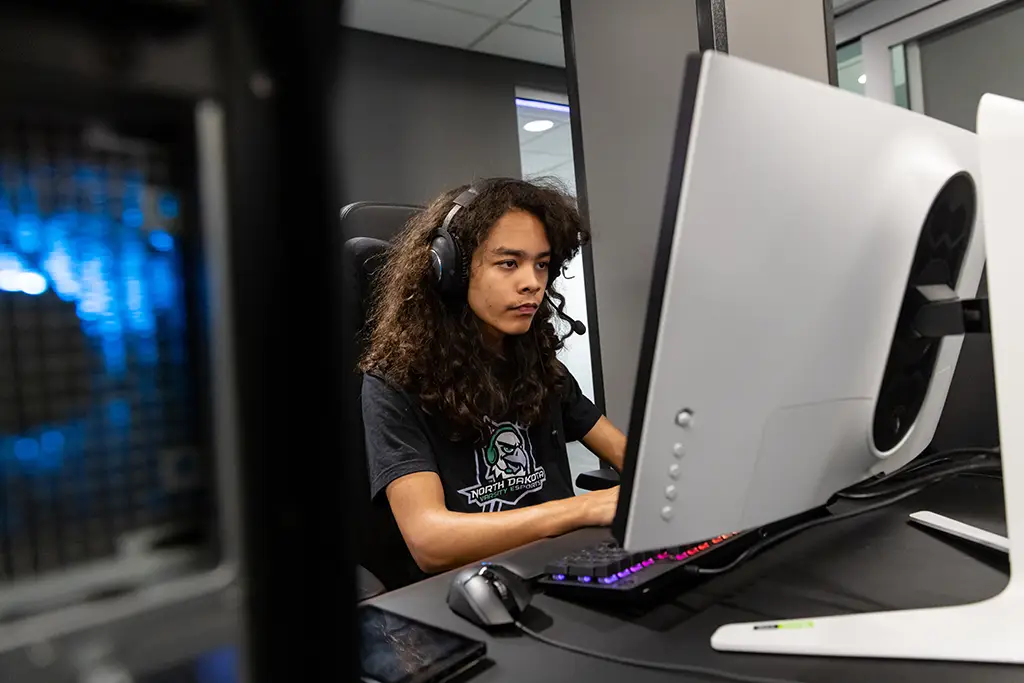
What Can You Do With an Esports Degree? Top Career Paths
With an esports degree, you can pursue a variety of roles that include but are not limited to player, coach, team manager, marketing specialist, content creator, and agent.
Request Information
As esports continues to grow, what once seemed like a far-fetched dream—pursuing a career in gaming—has become an everyday reality for many. With the industry projected to reach a revenue of $4.8bn in 2025, the question isn't whether a career in esports is possible—that's a given—but rather, what can you do with an esports degree?
The opportunities are there; it's just a matter of making your choice.
Esports Industry Projected Growth

- 2017: 1.2 billion
- 2018: 1.4 billion
- 2019: 1.8 billion
- 2020: 2.0 billion
- 2021: 2.5 billion
- 2022: 3.2 billion
- 2023: 3.8 billion
- 2024: 4.3 billion
- 2025: 4.8 billion
- 2026: 5.1 billion
- 2027: 5.4 billion
- 2028: 5.7 billion
15 Esports Careers You Can Pursue with an Esports Degree
"Esports is a booming industry," says Sandra Moritz, program director and professor of kinesiology at UND. She emphasizes that "competitive gaming is something that is here to stay, and there are many career areas in the field—everything from playing to coaching to broadcasting." This perspective is particularly relevant given the interdisciplinary nature of UND's bachelor in Esports program. The degree is designed to prepare students for a range of roles within the industry, offering a formal education that equips students with the skills and knowledge relevant to all the roles highlighted in the following section.
Esports Player
An esports player is an individual who engages in competitive video gaming, participating in organized tournaments or ranked play within specific esports titles. Unlike casual gamers, esports players commit significant time to mastering the mechanics, strategies, and teamwork required to excel in their chosen games.
For example, Johan Sundstein (N0tail) is a Dota 2 legend known for leading his team, OG, to multiple world championships. Similarly, in Fortnite, Kyle Giersdorf (Bugha) gained fame after winning the 2019 Fortnite World Cup at just 16 years old. In CSGO, Finn Andersen (karrigan) has distinguished himself as a top leader, guiding FaZe Clan to numerous victories.
The term "esports player" broadly encompasses those who engage in competitive gaming. However, within the field, distinctions are often made based on their ranking, level of professional involvement, and the formalization of their gaming efforts, such as whether they have contracts with esports teams or organizations.
Esports Coach
Even the most talented players need the guidance and support of a coach to maintain and elevate their performance. Esports coaches, much like their counterparts in traditional sports, are the masterminds behind a team's strategy. They, in many ways, influence how their players or team performs in the heat of competition.
Jordan Johnson, a junior at UND and captain of the university's League of Legends varsity squad, is a prime example of someone who recognizes the importance of coaching. Johnson, who is also pursuing a minor to complement his major in information systems, sees esports coaching as a valuable addition to his academic career.
Reflecting on his experience as a captain, he said, "I realized I'm not very good at the leadership side of things, in terms of being vocal and planning things out for us as a team. So taking on the minor will help my perspective on management, among other aspects of looking at things as a coach." Johnson's approach points to the critical role that coaching plays in leadership and personal development within the sport.
Esports Team Manager
An esports team manager is in charge of many aspects of a team's life, including contracts, schedules, and travel arrangements. They often act as a link between players and the organization. Their ultimate goal is to remove any distractions or obstacles that might hinder the players' performance, ensuring they can fully concentrate on achieving success in their competitions.
Blake Nahin, a sophomore and commercial aviation major at UND, never imagined he would become an esports team manager. But now, working with multiple varsity squads, he's helping shape the future of North Dakota Varsity Esports.
Nahin's role involves everything from organizing practice sessions to signing up teams for competitions, even though he admits his own skill level in games like Rocket League and Valorant isn't at the top tier. "Being a manager is a way of being involved with the teams, even though my skill level isn't as high in those games," Nahin explained. "It's been a really fun way to meet new people and make friends at UND."
Esports Event Organizer
An esports event organizer is responsible for planning and executing tournaments, whether it's a local event or a global championship. They coordinate everything from the venue and broadcasting to the prize pool and player accommodations.
The work of organizers like those behind ESL (Electronic Sports League), one of the oldest and largest esports organizations, runs the competitive gaming scene. The professionals working there host a wide range of tournaments and create an engaging experience for fans while offering prime exposure for sponsors.
UND alum, Kaleb Dschaak, is CEO of Fenworks, an epsorts and drone racing event host company. Kaleb established the first esports lab at UND and has taken is love for esports across the Midwest.
Esports Broadcaster/Commentator
Esports broadcasters or commentators, often called shoutcasters, bring the game to life for viewers. They provide play-by-play coverage, analysis, and insights during events, turning gameplay into a captivating experience.
Well-known commentators like Max "Atlus" Anderson improve the viewer experience in esports. Their ability to hype key moments, with their energetic and insightful commentary, turns a regular match into an electrifying event for both seasoned fans and newcomers. This makes watching the games more exciting as well as deepens fan engagement, drawing viewers into the action and helping the sport's audience grow.

Esports Content Creator
Esports content creators are individuals who produce a wide range of content related to esports, from gameplay highlights and tutorials to behind-the-scenes footage of events. These creators actually help shape how the public perceives esports and can build communities around specific games.
Take Tyler "Ninja" Blevins, for example, who became a household name through his Fortnite streams, drawing millions of viewers and bringing esports into the mainstream. Similarly, the S8UL Esports group has created a strong community by producing engaging content that connects fans with the excitement of competitive gaming.
Esports Journalist
Esports journalists report on the latest news, trends, and developments in the esports world. They write articles, conduct interviews, and provide insights that keep fans informed and engaged.
Journalists like Richard Lewis, who has built a reputation for his fearless investigative reporting, are the ones that help maintain transparency and accountability within the esports community. Lewis was the one who reported on the 2014 match-fixing scandal involving the North American Counter-Strike: Global Offensive team, iBUYPOWER. His reporting brought to light incriminating messages and betting activity that eventually led to lifetime bans for several players by Valve, the game's developer.
Esports Marketing Specialist
The primary responsibility of esports marketing specialists is to develop and execute marketing campaigns that resonate with the gaming community. To do so, they must be familiar with the culture of esports, from the games and platforms that dominate the industry to the behaviors and preferences of the audience.
In contrast to some other roles in esports, education and a strong foundation in marketing principles are particularly crucial for this job. They need to analyze market trends, audience data, and brand positioning in order to create campaigns that cut through the noise in a crowded digital space. This role often requires formal education in marketing, communications, or a related field, along with practical experience in the esports sector.
Esports Analyst
Esports analysts have a specialized role, working with in-game data to extract insights for coaches or game developers. They work closely with coaches to develop strategies based on the data they've gathered, ensuring that teams can optimize their performance. When employed by a game developer, their focus shifts to game balance, making adjustments that enhance the overall gaming experience.
The importance of an analyst's role can vary with the complexity of the game, but in many cases, their contributions are crucial to a team's success or a game's longevity. People like Indiana "Froskurinn" Black, a prominent League of Legends analyst, and Alberto "Crumbz" Rengifo, a former professional player who transitioned into an analyst role, are proof of the impact an analyst can have as they explain gameplay strategies and offer valuable insights for teams and viewers alike.
Esports Social Media Manager
Esports social media managers are the voice of teams, players, and organizations online. They are responsible for managing the teams' social media accounts across various platforms.
These managers are also deeply involved in interacting with fans, responding to comments, participating in conversations, and creating opportunities for fans to engage directly with players and the team. What they do has a huge impact on the way the team is perceived by the public.
Esports Community Manager
These managers are dedicated to always bringing together the gaming community and esports organizations. Their focus is on securing a strong, positive relationship between fans and the teams or brands they support. These managers make the fans feel heard and valued by engaging with the community. They acknowledge any concerns or issues the fans raise and work to address them with the relevant organizations.
However, this role is not all based on such simple interaction; community managers also often play a key part in organizing events or advocating for content that the fan base desires, keeping the community active and engaged. Their efforts help build a loyal and passionate fanbase, which is more than necessary for the long-term success and growth of esports organizations.

Esports PR Specialist
Esports PR specialists handle the public image of esports organizations and players. Their work often involves handling media relations, where they build and maintain relationships with journalists, coordinate press releases, and ensure that their clients receive positive coverage in the media. However, their role becomes particularly critical when dealing with crises.
For instance, if an esports team is embroiled in a scandal involving accusations of cheating or unsportsmanlike conduct, the PR specialist must quickly address the situation by communicating transparently with the public and media, conducting damage control, and possibly coordinating apologies or corrective actions. Additionally, they might have to navigate challenges such as player disputes or fan backlash over decisions made by the organization.
Even when there are no crises, PR specialists work to build the ongoing narratives that define their clients, ensuring that every public statement, interview, or social media post aligns with the brand's image and values.
Esports Consultant
Although esports is a relatively new field, the role of an esports consultant remains true to the traditional definition of a consultant—serving as a specialized expert who offers deep knowledge and strategic advice within their area of expertise. In this case, they guide businesses on industry trends, offer advice on best practices, and help companies navigate the esports field.
Esports consultants can assist with various tasks, such as helping a business expand into esports, conducting local market research, assessing facilities for their suitability as esports venues, and even developing plans to launch scholastic esports programs.
Esports Sponsorship Manager
Sponsorships are the lifeblood of the esports industry. It is through them that players and teams secure the necessary funding and resources to compete at the highest levels, invest in better training facilities, and access top-tier equipment. Sponsorships also help elevate esports' visibility and legitimacy by aligning it with well-known brands.
Therefore, the role of an esports sponsorship manager is crucial as they are the ones responsible for securing and managing sponsorship deals, building relationships with brands, and ensuring that both the sponsor and the esports entity benefit from the partnership. They craft proposals, negotiate terms, and oversee the activation of sponsorships, which might include branding on jerseys, product placements, or co-branded content.
Esports Lawyer/Agent
An esports lawyer or agent protects the legal and financial interests of players, teams, and organizations within the esports industry. These professionals handle a wide range of responsibilities, including drafting and negotiating contracts, managing sponsorship deals, and resolving disputes. Their focus is on how their clients are treated to prevent potential conflicts.
To practice as a lawyer, you must have a law degree and extensive legal training. While an esports degree helps with understanding the industry's dynamics, the specific legal challenges in it, such as intellectual property issues and contract law, require the expertise provided by formal legal education and experience.
Which Esports Career Should I Choose?
Choosing your path in esports is like picking your role in a game—you need to know your strengths, understand the game, and have a clear strategy. But how do you make the right choice when the industry offers so many exciting opportunities?
Start by thinking about what excites you most. Is it the adrenaline of competition, or do you love looking at the stats and strategies behind the scenes? Your passion will be your biggest motivator, so identify what really gets you fired up about esports.
Don't feel pressured to lock in your decision right away. Try out different roles through internships, side projects, or even volunteer work. The more you experiment, the clearer it will become where your true strengths and interests lie.
Conclusion
Choosing your esports career is like leveling up in a game—every decision counts, and with the right strategy, you will emerge victorious.Esports at UND is more than a program. Here, we have a community full of passion and expertise. With us, you'll find the support you need from people who love the sport, understand it, and are dedicated to advancing the field even further.
FAQs
Certainly! As long as you are interested in the field and want a structured way to break into the industry, then such a degree would definitely be a worthwhile investment.
You can start your esports career in two ways: the academic route or the self-taught approach. The academic one offers structured learning, industry connections, and specialized knowledge, giving you a solid foundation. Alternatively, you can focus on self-learning, gaining experience through participation in esports communities, and building a network, though this path may require more time and effort.